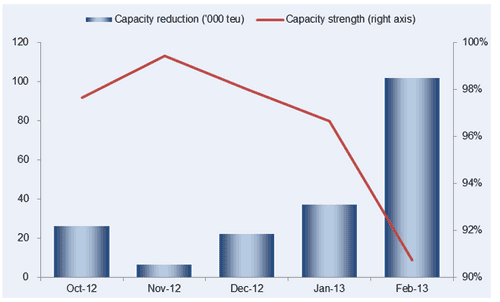From SCDigest's On-Target e-Magazine
- March 13, 2013 -
Global Supply Chain News: Is Your Container Coming? Only if the Sailing Isn't Cancelled by the Carrier
Ocean Carriers Really Ramp Up the Cancellations this Winter Instead of Adjusting Published Schedules; Goal of Capacity Reduction in Slow Period is the Same, but Impact on Shippers/Importers is Much Different
SCDigest Editorial Staff
While the supply-demand balance on Asia to North American and Europe routes continues to be strongly in the favor of shippers and importers, with resulting downward pressure on rates, of late the carriers are taking some matters into their own hands by arbitrarily cancelling sailings, with cancellations soaring in February.
According to new research from Drewry Shipping Consultants, nearly 150 sailings were cancelled on the Asia to North America and Asia to Europe routes between October and February, with the tactic having a demonstrable effect on freight rates and on the regularity of service provided to shippers, Drewry says.
SCDigest Says: |
 |
One medium sized shipper said that "Our ability to get through the winter unscathed has depended on our skill in managing the change, rather than on advice from carriers."
|
|
What Do You Say?
|
|
|
|
The big question: will the cancellations continue?
The practice is highly controversial. The carriers could simply withdraw service, and schedule fewer sailings, rather than cancelling scheduled routes. That would allow shippers and importers to better plan around the fewer sailings that are common during the winter months in the Northern Hemisphere.
Instead, many shippers are finding the cancellation of scheduled sailings "sometimes leaves them confronted with unexpected space shortages and roll-overs, as surrounding vessels quickly fill up," Drewry says.
The goal of schedule reductions and cancellations in slow months is the same, which is to reduce effective capacity and operating costs in the face of a drop in demand. But the former allows better supply chain planning, whereas the latter can cause costly supply chain delays and disruptions.
The practice also has a big impact on spot rates, as shippers look to quickly find additional capacity when a scheduled sailing they had booked is cancelled.
Matthew Beddow, manager of Drewry's Container Insight Weekly, noted that: "Although the strategy achieves the same result as the withdrawal of services at the end of the peak season – namely stopping average vessel utilization from falling to keep freight rates up – the effect on shippers is completely different."
The freight rate changes caused by sailing cancellations also appear more volatile for shippers than those achieved through service withdrawals, although any increases is quickly lost once normal service resumes, Drewry says.
According to Drewry, "All-in freight rate quoted to forwarders for spot cargo from Shanghai to Los Angeles fell by 19% between October and December, down to $2,057 per 40-foot container, according to the World Container Index, but then shot up by 16% in February, to $2,376/40ft. Rates from Shanghai to New York fell by 9%, down to $3,157/40ft, but then increased 12%, to $3,526/40ft. The average from Shanghai to Rotterdam fluctuated more violently, rising 20% between October and November, up to $2,578/40ft, then fell 11% in December, rose 14% in January, and fell 10% in February, down to $2,363/40ft."
Cancelled sailings in February are estimated by Drewry to have reduced available capacity in the headhaul Asia-West Coast North America route by about 100,000 TEU, for example, meaning that the trade was then operating at only 90% strength. (See graphic below.)
Eastbound Asia to West Coast Ports in North America
Capacity Reductions from Cancelled Voyages

Source: Drewry
Drewry says that "The strategy of withdrawing individual sailings is not new, particularly around the Chinese New Year holiday, which this year fell between February 10th to the 17th. What is new is the extended period of the practice, which suggests that it could in future become the norm, although nothing has yet been announced for March and April."
(Global Supply Chain Article Continued Below)
|